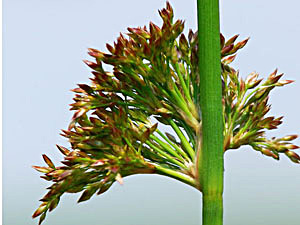
medicinal herbs
Soft Rush
Juncus effusus

Herb: Soft Rush
Latin name: Juncus effusus
Synonyms: Juncus communis effusus
Family: Juncaceae (Rush Family)
Medicinal use of Soft Rush:
The pith of the stem is antiphlogistic, depurative, discutient, diuretic, febrifuge, lenitive, lithontripic, pectoral and sedative. It is used in the treatment of sore throats, jaundice, oedema, acute urinary tract infection and morbid crying of babies.Description of the plant:

Plant:
Perennial
Height:
150 cm(5 feet)

Flowering:
June toAugust
Habitat of the herb:
Wet pastures, bogs, damp woods etc, usually on acid soils.Edible parts of Soft Rush:
Young shoots - raw. Some caution is advised, see the notes above on toxicity.Other uses of the herb:
Stems are used in basket making, thatching, weaving mats etc. The stems can also be dried then twisted or braided into ropes for tying or binding. Stems can be peeled (except for a small spine which is left to keep them upright) and soaked in oil then used as a candle. A fibre obtained from the stems is used for making paper. The stems are harvested in late summer or autumn, they are split and cut into usable pieces and then soaked for 24 hours in clear water. They are then cooked for 2 hours with lye and beaten in a blender. The fibres make an off-white paper. When mixed with mulberry fibres they can be used for making stencil paper. The whole plant was formerly used as a strewing herb.Propagation of Soft Rush:
Seed - surface sow in pots in a cold frame in early spring and keep the compost moist. When they are large enough to handle, prick the seedlings out into individual pots and plant them out in the summer if they have grown sufficiently, otherwise in late spring of the following year. Division in spring. Very easy, larger clumps can be replanted direct into their permanent positions, though it is best to pot up smaller clumps and grow them on in a cold frame until they are rooting well. Plant them out in the spring.Cultivation of the herb:
Wet pastures, bogs, damp woods etc, usually on acid soils.Known hazards of Juncus effusus:
Possibly toxic to mammals.Plant information taken from the Plants For A Future.
